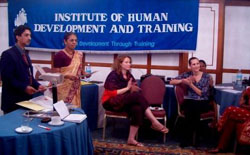Women in Asia to demand freedom, equal rights
Thousands of women from villages and cities across patriarchal Asia took to the streets Wednesday for International Women's Day to press for freedom, equal rights and an end to discriminatory laws. In Pakistan , 5,000 women rallied in Multan , a city in the eastern Punjab province, many chanting "Women demand freedom!" and "Women demand their rights!"

Among leaders of the rally was Mukhtar Mai, a woman who was gang-raped in 2002 on orders by a council of villagers near Multan as punishment for her brother's alleged affair with a woman from a higher caste family. Mai drew international attention after she spoke publicly about her ordeal. "I have dedicated my life to women's rights. Wherever a woman is oppressed, I will go there and fight for her rights," Mai told reporters at the rally, which was organized by a women's rights group.
About 1,000 other women, mainly school and college girls, staged a demonstration in front of Parliament in the capital, Islamabad , demanding that a law making it difficult to press rape charges be repealed. Some 300 women rallied in the southern city of Karachi pressing the same demand. They carried banners that read, "We reject all laws discriminatory to women."
Under the Hudood Ordinance, the testimony of four witnesses is required to prosecute a rape case, making punishment almost impossible because such attacks rarely happen in public. Thousands of cases of abuse against women are reported in Pakistan each year, including "honor killings" of women murdered by male relatives because of accusations of adultery or marrying without family consent.
In mostly Muslim Bangladesh, where women lead the ruling and main opposition political parties, thousands joined calls for an end to attacks with flesh-burning acid that leaves hundreds of women disfigured each year. Protests took place in nearly 30 cities across Bangladesh on Wednesday with both men and women marching together.
They carried placards and banners, reading, "No more acid attacks on women" and "Raise funds for acid victims."
"We have no other choice but to fight against such heinous crimes," said, Motiur Rahman, one of the organizers of the rally. Most of the victims are women attacked by spurned lovers, but recently more men and children are being splashed with the agonizingly painful sulfuric acid in family arguments or disputes over property, victim support groups say.
The chemical is easily obtained from battery shops or jewelers, who use it to brighten precious metals. "We are here today to promise that we will make acid terrorism a history," Ilias Kanchan, a popular film star, told the Dhaka rally. "We have to end this terrorism at any cost." In Indonesia 's tsuanmi-ravaged province of Aceh , hundreds of women protested what they said was unequal treatment under Islamic law.
Aceh is the only province in Indonesia to have imposed Shariah law, which requires women to wear headscarves and men to pray five times a day. But the women complain that they are the only ones to be targeted by the heavy-handed religious police.
"Some of my friends were detained by the Shariah police just because they wore jeans," said Raihan, 23, a protest organizer. Protesters also urged parliament to allow women greater freedom in dress. "Women in tight dresses are not demons or corrupt," one march leader declared.
In the Indonesian capital Jakarta, hundreds more women marched against a proposed anti-pornography bill that as well as barring nudity in art, would also make the baring of legs or shoulders in public a crime. The bill also calls for prison terms of up to 10 years and fines of up to US$100,000 ( Ђ 83,672) for kissing in public.
"This is just another form of discrimination," Mariana, who like many Indonesians goes by only one name, told the crowd. "We have to stand up against this kind of oppression." Indonesia has a secular government, and most of the country's 190 million Muslims practice a less austere form of the faith than many Islamic nations in the Middle East and South Asia . But a handful of Muslim-based political parties are pushing for the passage of the bill to prevent the country's "moral decay", reports the AP.
N.U.
Subscribe to Pravda.Ru Telegram channel, Facebook, RSS!




